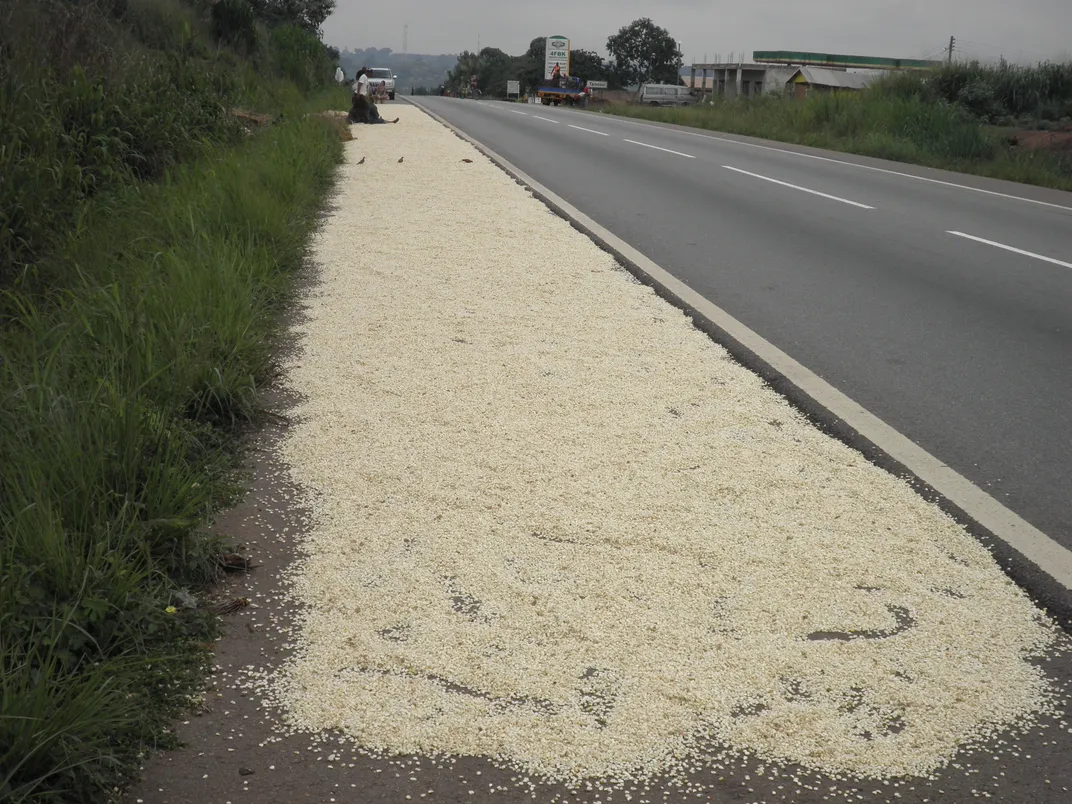This Solar-Powered Dehydrator Could Help Small Farmers Reduce Food Waste
An Indiana startup hopes to help farmers in lower income countries keep their crops safe using a cheap, portable dehydrator system
/https://tf-cmsv2-smithsonianmag-media.s3.amazonaws.com/filer/94/a6/94a6b9cf-e9fc-4904-95c0-18452aaae95f/crop-drying.jpg)
Walking through Hong Kong’s historic Sheung Wan district, you’ll still see flat bamboo baskets laid on the curb amidst the taxis and exhaust-belching delivery motorcycles. Inside lie rows of drying seafood or plants—scallops, sea cucumbers, orange peel, all turning brown and gnarled in the sun.
Roadside food drying is still practiced in much of the world. Farmers and food vendors use the heat and flatness of the street to dry everything from grain crops like corn and wheat to seafood to fruit. But this method leaves food vulnerable to contamination from mold, air pollutants, insects and more. Globally, more than a third of food is lost to post-harvest contamination.
An agricultural scientist at Purdue University aims to change that. Klein Ileleji has developed two technologies for drying food quickly and hygienically. The first is the Dehytray, a food dehydration tray with a protective cover that concentrates solar energy for faster drying times. The second is the Dehymeleon, a solar dryer that can hold 10 Dehytrays, and that can store extra solar energy for use as a power generator at night. The solar dehydrator research was funded by a USAID Feed the Future Innovation Lab for Food Processing and Post-Harvest Handling.
Ileleji first started thinking about dehydration in 2010, when he was working on a project in Ghana.
“We were doing a survey on farmers’ challenges, and one of the biggest challenges was aflatoxin in their grains, and the primary cause of that was improperly dried grains,” he says. “I knew drying was a major challenge because I was born and raised in Nigeria. But I was raised in the city. In Ghana was the first time I encountered it first-hand.”
Aflatoxins, produced by molds growing on crops like corn and peanuts, can kill if eaten in high levels. But low-level exposure over time can cause cancer and other illnesses. Higher income countries screen for aflatoxins and won’t buy contaminated products. But local growers in lower income countries don’t have this luxury.
Ileleji and his wife, Reiko Ileleji, started a company, JUA Technologies International, to come up with better drying solutions. The word ‘jua’ in Kiswahili means ‘sun.' The company just received $150,000 of federal and state grants to develop their technology further.
The Dehytray is already on the market, and the Ilelejis have found a distributor in Kenya and are working on distribution in other African countries. The trays, which are about three feet long, can be used in the sun with protective covers, or stacked inside a dehydrator for larger-scale drying. They retail for $125 for customers in North America, Europe, Japan, Singapore and Australia; customers in other regions get individualized quotes. Farmers can use them to dry nearly any food, from fruit to grain to seeds. Because of the way they concentrate sunlight, the trays dry crops far more quickly than open sun, shaving up to a day off dehydration times.
This year the Dehytray won a product innovation award from the American Society of Agricultural and Biological Engineers. It was also a finalist in the food category of the Fast Company World Changing Ideas awards.

It's key that the dehydrators run on free natural energy, since many developing world farmers don't have reliable access to electricity.
"If it takes energy and takes resources that folks don’t have to use or to burn, they’re not going to use it," says Gretchen Mosher, a professor of agricultural and biosystems engineering at Iowa State University. "And it will just become one of those projects that the Western people come in and develop and then it sits there after they leave."
Ileleji's dehydrators have been "really thoughtfully designed in terms of who’s going to use this and why, and that’s what makes it kind of innovative," Mosher says.
The needs of the poor in developing nations are often overlooked by companies, Ileleji says. In most countries it’s easy to purchase a luxury car (presuming you have the cash), but difficult—until now—to purchase a simple device like the Dehytray.
“How is it you can buy a Mercedes-Benz but you can’t purchase a solar dryer?” Ileleji asks. “Technologies that are needed by people at the bottom of the pyramid are not available.”
Early reports from Kenyan users have been positive, Ileleji says. Rural farmers appreciate the device’s ease of assembly, cleanliness and portability.
“You can carry it in your vehicle or bicycle or small canoe,” he says. “When the sun sets in a different direction, you can just carry the tray [to capture more sunlight].”
The Dehymeleon is still under development. The finished product will be “like a microwave,” Ileleji says, in that a user can simply press a button—‘corn,’ say—and the machine will automatically set itself to the appropriate temperature and drying time. It will also store up extra solar energy to serve as a power generator to charge farmers' cell phones or run their lamps at night when it's not drying crops. Ileleji hopes to a have a commercial product ready in about two years. He has several patents on both the Dehytray and Dehymeleon technologies.
Ileleji says his drying technologies can be used anywhere from rural villages to organic farms to suburban backyards. He uses his own Dehytray to make kale chips at home in Indiana. But for people in difficult situations, it could be more than just a nifty tool. Ileleji thinks of communities in his home country of Nigeria displaced by Boko Haram.
“In a refugee camp where you can encourage farming to take place, you can deploy the drying system because it’s small, its stackable,” he says. “I’m really excited to see how various needs are met by the technology.”
/https://tf-cmsv2-smithsonianmag-media.s3.amazonaws.com/accounts/headshot/matchar.png)
/https://tf-cmsv2-smithsonianmag-media.s3.amazonaws.com/accounts/headshot/matchar.png)